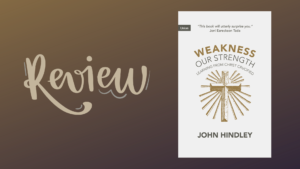
How do you feel about weakness? If you’re anything like me, you’re not a fan. There are moments when we want to shun weakness and pretend we are strong. Other moments when we are overwhelmed by weakness and feel there is no hope. Weakness rarely feels like something to welcome. Yet, in his latest book, Weakness Our Strength, John Hindley encourages us to think about weakness in a new and exciting way.
As the pages progress, we are confronted with the reality that, as humans, we are weak people. People who are dependent on God – people called to be inter-dependent on others. We can’t be everywhere. We can’t know everything. We are limited. We are mortal. And suffering and sin can be debilitating at times. We are weak just by virtue of being human – weaker still because of the outworkings of the Fall. Weakness is inevitable. But it also confronts us with a liberating truth: “weakness is not the traitor we take it for. Rather it is our friend. Weakness can show us more of Jesus and how we may follow him than strength ever could. I am weak. But with Christ, we are strong” (p35).
From this starting point, the book takes us on a tour of weakness. Along the way:
- We are encouraged to remember that it is a misunderstanding of Scripture to assume that doing the Lord’s work will always look like fullness and ease. Sometimes doing the Lord’s work looks like hardship, brokenness and pain. Jesus deliberately called a bunch of weak people to follow him and called them (and us) to follow amid the mess of the world all around.
- We are nudged to embrace weakness as reality, but never to be defined by our weakness. It is not a status we can wallow in, or use as an excuse to avoid the calls of Christ. Jesus meets us in our weakness, and in our weakness leads us on.
- We are galvinised to share our weakness in conversation with others – to be the community that God has created us to be. And along the way, we are challenged to check to see if we may have a tendency to try to cover our weakness – to assume roles within the church that make us look like the strong helping the weak – rather than being willing to be known as one of the weak people who are together following God.
- We are introduced to the God who loves us too much to let us believe we are – or even could be – strong enough to be in control. We are introduced to the God who knows our weakness – our limits – and yet works in us in astonishing ways (1 Corinthians 1:26-27).
- We are helped to feel the “folly” of the cross (1 Corinthians 1:18) – the unimpressive, seemingly weak act that changed everything for humankind. And encouraged to fix our eyes on the only truly strong one – the risen Saviour, Jesus who reigns over all.
- We are rallied to the call of the church – to be a place where the weak are welcomed and called to follow Christ. A community where the weak care for one another. A gathering where the weak are loved and where the “upfront” gifts are not celebrated more than the quiet ones. Where competency is not valued more than sacrificial love. But also where confidence in the Lord’s equipping for life and service runs deep – not least confidence in his Spirit-inspired word (Ephesians 6:17-18).
- We are reminded that – in the new heavens and the new earth – “the weakness of our fallen state, of our inherited guilt, of our inevitable death is completely undone” (p127). At our weakest, in death, we are welcomed into God’s beautiful and eternal love.
At 140 pages in length, it’s not a comprehensive book. It’s written at a popular level, it’s not an academic treatise that dots every ‘i’ and crosses every ‘t’. But it is wonderfully reorientating, deeply inspiring, profoundly helpful in its reflection on a topic that many of us would prefer to avoid. And, it centres on Christ, enabling us to know the wonder of these famous words:
My grace is sufficient for you, for my power is made perfect in weakness. Therefore I will boast all the more gladly of my weaknesses, so that the power of Christ may rest upon me. For the sake of Christ, then, I am content with weaknesses, insults, hardships, persecutions, and calamities. For when I am weak, then I am strong.
(2 Corinthians 12:7-10)
Weakness Our Strength by John Hindley is published by Union Publishing (2023) and is also available from 10ofthose.